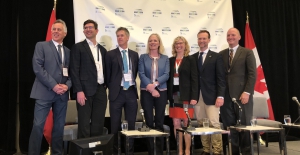Clean Energy Canada | Canada, B.C. and Vancouver all pledge to support cleaner trucks and buses
May 28, 2019

VANCOUVER—If you think low- and zero-emission vehicles stop at electric cars, think again. Trucks, buses, even garbage trucks—there are many types of vehicles that are undergoing a technology shift as the world transitions to clean energy.
Today, the governments of Canada, B.C., and the City of Vancouver, along with Vancouver transit provider TransLink, have all pledged to support and increase the use of low- and zero-emission commercial vehicles.
Transitioning heavy-duty vehicles presents unique challenges, many of which are being addressed at the Drive to Zero workshop held Tuesday in Vancouver as part of the Clean Energy Ministerial, where these announcements were made.
The workshop—co-hosted by Clean Energy Canada, the City of Vancouver, and California-based CALSTART—is helping governments and industry identify the best path forward for adopting low- and zero-emission commercial vehicles like electric buses and hydrogen-powered trucks.
In March, a Clean Energy Canada report found that Canada has been slow to adopt electric buses compared to cities like L.A. (which is aiming to fully electrify its bus fleet by 2030), despite being home to several leading electric bus manufacturers.
During the event, Catherine McKenna, Canada’s minister for the environment and climate change, announced that the federal government will support a Drive to Zero pledge.
The Canadian government is the first national government to sign up to the pledge, which is currently supported by eight local governments in the U.S.
McKenna’s announcement was joined by similar commitments from the government of B.C., the City of Vancouver, and TransLink. The move follows the introduction of TransLink’s first battery-powered electric bus as part of a zero-emission bus pilot.
QUOTES
“Reducing pollution and improving the competitiveness of the transportation sector, including commercial vehicles, is a priority for the Government of Canada. We are proud to endorse the Global Commercial Drive to Zero Pledge, bringing us one step closer to a clean energy future.”
—The Honourable Amarjeet Sohi, Canada’s Minister of Natural Resources
“British Columbia is leading the way on the transition to zero emission vehicles and a clean economy. By signing the Drive to Zero pledge we are continuing our commitment to grow innovation and clean jobs through bold leadership that builds on our work to make all light-duty vehicles sold in B.C. zero-emissions by 2040.”
—The Honourable George Heyman, Minister of Environment and Climate Change Strategy, Province of British Columbia
“Our government’s CleanBC plan will cut climate pollution and create good family-supporting jobs. The Drive to Zero pledge builds on both CleanBC and our new Zero-Emission Vehicles Act. We’re proud to be leaders in the clean energy revolution.”
—The Honourable Michelle Mungall, Minister of Energy, Mines and Petroleum Resources, Province of British Columbia
“The Drive to Zero Pledge is in line with our efforts and commitment to support the transition to cleaner renewable fuels and low-emission vehicles. Vancouver is proud to continue our efforts in advancing policies that are already supportive and encourage near zero emissions with the opportunity to collaborate with others across industry and government.”
—Kennedy Stewart, Mayor of Vancouver
“Canada is well-positioned to be among the leaders transitioning to zero-emission commercial fleets, delivering both environmental and economic benefits. We’re a big country and we move a lot of freight by truck. We’re also a heavily urban country, and as cities grow, more is being invested in public transit. Shifting to zero-emission trucks and buses, many of which are made right here in Canada, will cut both carbon pollution and fuel costs. It’s a win-win.”
—Merran Smith, Executive Director, Clean Energy Canada
“Drive to Zero’s mission is to drive private and public sector technology innovation as well as economic and job growth, while also helping governments achieve Paris Accord targets and improving urban air quality.”
—John Boesel, CEO and President of CALSTART